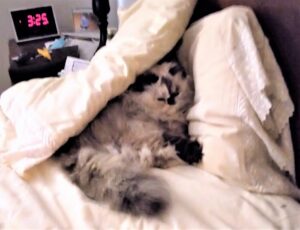
Getting enough sleep helps you stay healthy and alert. But, many older people don’t sleep well. If you’re always sleepy or you find it hard to get enough sleep at night, it may be time to see a doctor. Waking up every day feeling tired is a sign that you are not getting the rest you need.
Older adults need about the same amount of sleep as all adults—7 to 9 hours each night. But, older people tend to go to sleep earlier and get up earlier than they did when they were younger.
There are many reasons why older people may not get enough sleep at night. Feeling sick or being in pain can make it hard to sleep. Some medicines can keep you awake.
Being older doesn’t mean you have to be tired all the time. You can do many things to help you get a good night’s sleep. Here are some ideas:
Follow a regular sleep schedule. Go to sleep and get up at the same time each day, even on weekends or when you are traveling.
Avoid napping in the late afternoon or evening, if you can. Naps may keep you awake at night.
Develop a bedtime routine. Take time to relax before bedtime each night. Some people read a book, listen to soothing music, or soak in a warm bath.
Try not to watch television or use your computer, cell phone, or tablet in the bedroom. The light from these devices may make it difficult for you to fall asleep. And alarming or unsettling shows or movies, like horror movies, may keep you awake.
Keep your bedroom at a comfortable temperature, not too hot or too cold, and as quiet as possible.
Use low lighting in the evenings and as you prepare for bed.
Exercise at regular times each day but not within 3 hours of your bedtime.
Avoid eating large meals close to bedtime—they can keep you awake.
Stay away from caffeine late in the day. Caffeine (found in coffee, tea, soda, and chocolate) can keep you awake.
Remember—alcohol won’t help you sleep. Even small amounts make it harder to stay asleep.
Insomnia Is Common in Older Adults
Some older adults who have trouble sleeping may use over-the-counter sleep aids. Others may use prescription medicines to help them sleep. These medicines may help when used for a short time. But remember, medicines aren’t a cure for insomnia.
People with restless legs syndrome, or RLS, feel like there is tingling, crawling, or pins and needles in one or both legs. This feeling is worse at night. See your doctor for more information about medicines to treat RLS.
Periodic limb movement disorder, or PLMD, causes people to jerk and kick their legs every 20 to 40 seconds during sleep. Medication, warm baths, exercise, and relaxation exercises can help.
Rapid eye movement, or REM, sleep behavior disorder is another condition that may make it harder to get a good night’s sleep. During normal REM sleep, your muscles cannot move, so your body stays still. But, if you have REM sleep behavior disorder, your muscles can move and your sleep is disrupted.
Some people find that relaxing their bodies puts them to sleep. One way to do this is to imagine your toes are completely relaxed, then your feet, and then your ankles are completely relaxed. Work your way up the rest of your body, section by section. You may drift off to sleep before getting to the top of your head.
After turning off the light, give yourself about 20 minutes to fall asleep. If you’re still awake and not drowsy, get out of bed. When you feel sleepy, go back to bed.
